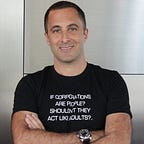Nobel’s Social ‘Justice’ Dilemma
2020 Faux-Nobel in Economics Lies at the Hearth of Global Strife
Alfred Nobel established five Nobel Prizes to award the work of “those who, during the preceding year, have conferred the greatest benefit to humankind” with the prize for peace recognizing the advancement of “fellowship among nations, the abolition or reduction of standing armies, and the establishment and promotion of peace.”
With the hypocrisy illuminated by the 2020 faux-Nobel economic award, in the midst of a socioeconomic crippling global pandemic, the Nobel Foundation should divorce itself from its irreverent union with professional economists.
Amid racial conflict, wealth disparity, and health inequity being exacerbated by economically driven partisanship, two Stanford University professors are the latest economists to gain global notoriety under the guise of Alfred Nobel’s name. Professors Paul Milgrom and Robert Wilson were awarded the “Sveriges Riksbank Prize in Economic Sciences in Memory of Alfred Nobel,” for “improvements to auction theory and inventions of new auction formats.”
Not a true Nobel Prize, the economic prize was established in 1968 when professional economists, in collusion with the Swedish National Bank, appropriated the Nobel name to affix undue authority to their idealistic economic models based primarily on white patriarchal “nuclear” families. The award is given the Monday following the Nobel Prizes, but is distinctly not one of the official prizes, as designated by Alfred Nobel, first awarded in 1901.
This year, the scientific prizes for medicine, physics, and chemistry were given for contributions to fighting Hepatitis, a better understanding of black holes, and “for the development of a method for genome editing” known commonly as CRISPR. Paradigm-shifting discoveries that move the understanding of science forward for all of humanity.
By contrast, the economic prize was awarded for advancing auction technology that helps Silicon Valley giants to colonize human attention. Each of the up to 10,000 ads we are served daily is driven by auctions of our personal data profiles. While embellished for impact, the recent ‘Social Dilemma’ docudrama details how these auctions work. In tandem with improved auctions, Stanford University’s contributions to the field of psychological manipulation enable algorithms that tear through our country’s social fabric by targeting our prehistoric brain stem and isolating social media users from more compassionate human engagement.
Unlike the natural sciences, in which laureates primarily wield influence among their peers and are subject to scientific review, economists are awarded for either impractical theory or infinitesimal models that are either too complex to validate or too niche to be of great “benefit to humankind.” As the former has grown indefensible, work of recipients has most often been focused on the latter. Overall, the economic prize is more similar to the prize in literature which is completely subjective. However, due to the inability of the niche to improve the state of the whole, the economic prize is more akin to awarding the grammatical correctness of the 2020 laureate, Louise Glück, instead of recognizing her “unmistakable poetic voice that with austere beauty makes individual existence universal.”
Much like the Olympics, the Nobel Prize has been declining in broad public fanfare as media fatigue (driven by those auctions) continues to overwhelm human attention. But more insidiously, the appropriation by Sweden’s central bank has diminished the prestige of the original awards. Economists have monetized the prestige for their own market interests–to the detriment of the public trust. Whereas Sweden’s Nobel prizes were inherently valued as achievements, a media reference of a laureate today, can improve a headline’s auction performance–often aiding the spread of disinformation and fake news.
Friedrich Hayek, a founder of neoliberalism, upon receiving the award in 1974 recognized the philosophical conflict of the two Swedish-born awards, noting a conference of “authority which in economics no man ought to possess” and confessed that had he been consulted, would “have decidedly advised against it.”
Beyond the influence of individual economists, the institutional influence of the prize must be considered. As world governments and the public question the influence of the biggest technology companies, the students of the largest peddlers of faux-Nobel influence on those companies should also challenge their institutions. With multiple universities claiming the same individual laureate based on varied affiliations, just four universities have a lions-share of the 86 total awards given. Meaning the economic departments of Harvard (11), Stanford (19), MIT (21), and the University of Chicago (31) have fabricated tremendous global influence.
Young people today bear the full weight of the faux-Nobel’s half century of influence. With America’s industries auctioned to the highest bidder, youth today are subjected to perpetual war and militarized local police, under crushing student debt and the diminished value of liberal arts, while living with parasitic technology that preys upon youthful insecurity and manipulates the American values of their parents and grandparents.
Serendipitously, the 2020 Nobel Prize laureates and #FauxNobel economists selected this year remarkably illustrate the paradoxical conceit of attempting to elevate the influence of economists through manipulation of their public image. As economist John Maynard Keyes opined long before the #FauxNobel was concocted, “If economists could manage to get themselves thought of as humble, competent people, on a level with dentists, that would be splendid!”
In the illumination of that conceit, it is beyond time for a public movement to extract the unwarranted influence of the #FauxNobel over the actions of the technology sector and global economic thought.
You can help by doing the following:
- Sign our petition to end the influence of the #FauxNobel
- Share this article with others using the #FauxNobel hashtag
- Join our #FauxNobel discussion at Industrial Age Detox on Facebook
Please take a second to “Clap” for this story here on Medium and join an ongoing discussion at Industrial Age Detox on Facebook.
